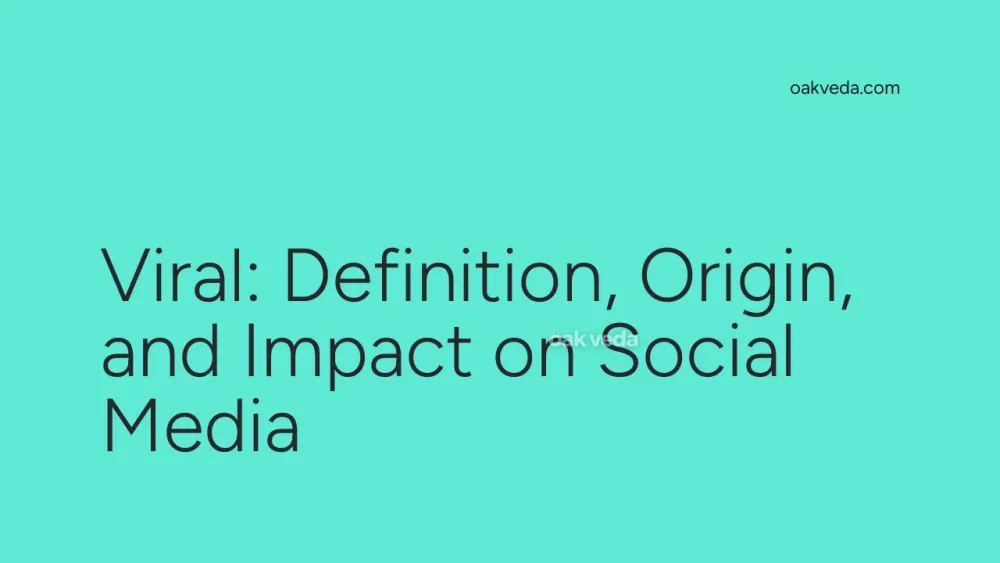
What is Viral?
In the context of social media, "viral" refers to content that rapidly spreads across platforms, gaining massive attention and engagement in a short period. This phenomenon occurs when users share content extensively, causing it to reach a significantly larger audience than its original target. Viral content can take various forms, including videos, images, memes, tweets, or even audio clips.
Origin and Development of Viral Content
The concept of viral content predates social media, with its roots in viral marketing strategies of the late 1990s. However, the rise of social platforms in the mid-2000s dramatically accelerated the potential for content to go viral. Platforms like YouTube, Facebook, and later Twitter and Instagram, provided the perfect ecosystem for rapid content sharing and exponential growth in visibility.
How Viral Content Works
Viral content typically follows a pattern:
- Creation: An individual or brand creates compelling content
- Initial sharing: The content is posted on one or more social platforms
- Amplification: Users engage with and share the content
- Exponential growth: As more people share, the content's reach expands rapidly
- Peak: The content reaches maximum visibility and engagement
- Decline: Interest gradually wanes as the content saturates its potential audience
The key to virality lies in the content's ability to evoke strong emotions, relate to current events, or tap into universal experiences that resonate with a broad audience.
Types of Viral Content
Viral content can be categorized into several types:
- Entertaining: Humorous videos, memes, or witty posts
- Informative: Educational content, life hacks, or surprising facts
- Emotional: Heart-warming stories, inspirational messages, or shocking revelations
- Controversial: Polarizing opinions or debates that spark intense discussions
- Trendy: Content that aligns with current pop culture or social movements
Popular Examples of Viral Content
Some notable examples of viral content include:
- The ALS Ice Bucket Challenge (2014)
- "The Dress" color debate (2015)
- Pokemon Go phenomenon (2016)
- Area 51 raid memes (2019)
- TikTok dance challenges (ongoing)
These examples demonstrate how diverse content can capture global attention and dominate social media conversations.
Impact of Viral Content on Social Media Culture
Viral content has significantly shaped social media culture:
- Attention economy: Users compete for visibility in an increasingly crowded digital space
- Meme culture: The rapid creation and evolution of internet memes
- Influencer rise: Individuals gaining fame and influence through viral content
- Platform features: Social media platforms developing tools to facilitate content sharing and virality
- Marketing strategies: Brands focusing on creating shareable, potentially viral content
Controversies Surrounding Viral Content
While viral content can bring positive attention, it also has potential downsides:
- Misinformation spread: False or misleading information can go viral, causing real-world consequences
- Privacy concerns: Individuals may become unwilling subjects of viral content
- Mental health impact: The pressure to create viral content can lead to stress and burnout
- Fleeting fame: Viral sensations often struggle to maintain relevance after their moment in the spotlight
- Exploitation: Brands or individuals may exploit sensitive situations for viral potential
How Brands and Influencers Use Viral Content
Brands and influencers leverage viral content to:
- Increase brand awareness
- Engage with their audience
- Drive traffic to their websites or products
- Build brand personality and relatability
- Stay relevant in fast-paced social media landscapes
Successful strategies often involve:
- Creating timely, relevant content
- Encouraging user-generated content
- Collaborating with influencers
- Utilizing trending hashtags and challenges
- Engaging with followers authentically
Future Trends Related to Viral Content
As social media evolves, so does the nature of viral content:
- Short-form video dominance: Platforms like TikTok and Instagram Reels are shaping viral trends
- AI-generated content: Artificial intelligence may play a larger role in creating potentially viral content
- Augmented reality (AR) experiences: Interactive AR filters and effects could become the next viral sensation
- Niche virality: Content going viral within specific communities rather than globally
- Ephemeral content: Temporary posts (e.g., Stories) becoming a source of viral trends
FAQs about Viral Content
-
Can you predict if content will go viral? While there's no guaranteed formula, factors like emotional appeal, relevance, and timing can increase the chances of content going viral.
-
How long does viral content typically last? The lifespan of viral content varies, but most trends last from a few days to a few weeks before fading.
-
Is going viral always beneficial? Not necessarily. While it can bring attention, going viral can also lead to negative consequences depending on the content and context.
-
How can businesses leverage viral content? Businesses can create shareable content, participate in trends, and engage with their audience to potentially benefit from viral moments.
-
Does viral content translate to long-term success? Not always. While viral content can provide a temporary boost, sustained success requires consistent engagement and valuable content creation.
In conclusion, viral content remains a powerful force in shaping social media culture and online interactions. As platforms and user behaviors continue to evolve, the nature of viral content will adapt, presenting new opportunities and challenges for individuals, brands, and marketers in the digital space.
You may be interested in:
- B2C: Definition, Origin, and Impact on Social Media Marketing
- Shadowban: Definition, Origin, and Impact on Social Media
- Ate: Definition, Origin, and Impact in Social Media Slang
- L (Loss) in Social Media: Definition, Origin, and Impact
- Social Media Analytics: Definition, Origin, and Impact
- CapCut: Definition, Origin, and Impact on Social Media

